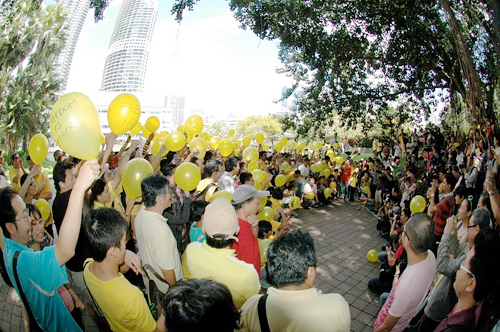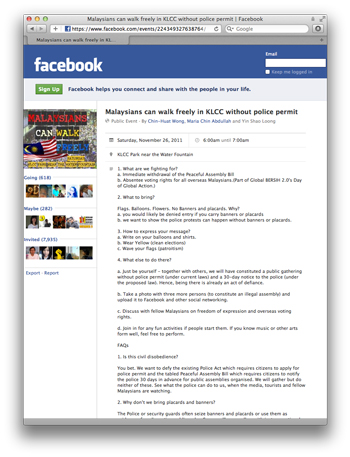I WOULDN’T normally consider myself an outlaw. Last month, for example, I submitted another deferment request for the six-year-old National Service summons that I have yet to fulfil because of school calendars. I also don’t buy pirated DVDs. But recently I have found myself among the many in a position where democratic citizenship conflicts with the law.

We Malaysians have been active contributors to what pundits have dubbed the Year of the Protest. One of my friends says that you aren’t a real Malaysian until you’ve felt tear gas. It was this friend’s car that gave me my first chance to be a real Malaysian on 9 July 2011. And apart from that searing, iconic clash between citizens and government at the Bersih 2.0 rally, this year has seen numerous other instances of ordinary Malaysians asserting that practical democracy trumps coercive laws.
Malaysians can
Take the “Malaysians can … without a police permit” movement that emerged in November in opposition to the misleadingly named Peaceful Assembly Bill 2011. The first such event, “Malaysians can walk freely in KLCC without police permit”, saw roughly 300 people gather in the KLCC park on 26 Nov in defiance of the existing Police Act and the tabled Peaceful Assembly Bill. In the words of its Facebook page, “Is this civil disobedience? You bet.”
The third event in this series had been planned as a 10 Dec flash mob but transformed into “Malaysians can go shopping & pose with Xmas trees without police permit” when threatened with legal action from KLCC’s management. Organisers also compiled receipts from participants’ KLCC shopping to demonstrate their concern for economic activity alongside political freedoms. In total, these flashmobbers spent more than RM2,400 at KLCC before protesting. The fourth event, dubbed “Malaysians can picnic in yellow at KLCC Park without a police permit”, was held on 17 Dec to send a clear message to the Dewan Negara, which meets this week, that there is opposition to the Bill even if it has been passed by the Dewan Rakyat.

The government should be proud. All the time and money invested in teaching us Kemahiran Berfikir Kritis dan Kreatif is clearly yielding fruit. Not only have we become a generasi celik IT, we’ve been using Facebook and Twitter to criticise state-imposed restrictions on expression in all kinds of creative ways.
Of course, this creative engagement isn’t confined to those calling for political renewal. Over the last few months, pro-Umno blogger Papa Gomo has been generating highly imaginative and damaging allegations on the internet.
The Barisan Nasional (BN) government also showed a particularly innovative streak in excluding a minimum jail term from the Peaceful Assembly Bill but included fines of up to RM20,000. I know I can deal with tear gas and, if it were to happen, I have a huge variety of role models who endured unjust imprisonment. But as a student on a limited stipend, a large fine is at least as scary as a baton-wielding police officer — and I’m more fortunate socioeconomically than many Malaysians.
Patriotism undiluted
Still, as a student I’m allowed to be idealistic. And I would like to think that the current groundswell of inventive dissent will prove resilient to new constraints. The activism of overseas Malaysians who don’t let distance dilute patriotism has been particularly heartening.
One of the “Malaysians can … without police permit” and Kill the Bill organisers currently studies in the US. At the 26 Nov Global Day of Action rally outside the Malaysian High Commission in London, one of the organisers was of Malaysian-British parentage. She had spent half her life in England but led our chanting with vigour in fluent Bahasa Malaysia.
Maybe this is why school children are taught to avoid the degenerate influence of foreign budaya kuning.
Right to vote
In fact, the MCA‘s Datuk Ei Kim Hock recently contended that those of us who live overseas don’t deserve to vote because we are out of touch and get our news from dubious sources.
Ei’s observations may be understandable if he were talking about the staff at Malaysian embassies abroad. If a July study of Malaysian foreign missions by MyOverseasVote and my interactions with embassy officials are anything to go by, Malaysian consular staff are consistently misinformed about voter registration. This is notwithstanding constitutional provisions and multiple directives from the Election Commission (EC) over the past year.
As with peaceful public assembly, voting is a fundamental democratic right that is presently and unjustifiably hindered for some Malaysians. For some, the primary barrier to voting is legal: only a few categories of overseas Malaysians are allowed a postal vote. For others, the obstacle is in implementation: as a full-time student, I have submitted my absent voter registration but have also been told by consular staff that the EC hasn’t sent postal ballots to London “in ages”.
Although government leaders may argue that overseas voting is an impractical waste, there is reason for optimism — again, because of dynamic dissent from Malaysian citizens. In addition to the monumental work of Bersih 2.0, MyOverseasVote has proven a force to be reckoned with through its legal activism and public statements.
Another chronic bias in our electoral system, severe gerrymandering in delineating federal constituencies, has similarly come under the scrutiny of grassroots activists. At a late November meeting of the parliamentary select committee on electoral reform, retiree Ng Chak Ngoon detailed a host of malapportionments. This includes the fact that BN-held Putrajaya contains only one-seventeenth of the voters in the largest constituency, Opposition-held Kapar.

Severe gerrymandering, a chronic bias in our electoral system
Those who cannot remember the past
In Malaysian politics, it is almost axiomatic that any codified encroachments of rights will be justified by invoking the spectre of the 13 May 1969 riots.
Besides affirmative action policies and emergency regulations, the 1969 tragedy resulted in another persistent national code: the Rukunegara, our national creed. Every week, millions of students across the country recite part of the Rukunegara — they are taught the words enumerating specific obligations, not the words voicing shared aspirations.
But it is the whys that give meaning to the whats, the cita-cita that precede the prinsip-prinsip. Thankfully, recent history has shown that many of us are more than willing to focus our efforts on building a unified, democratic, equitable, liberal and progressive nation – whether or not we get a police permit. ![]()
Hwa Yue-Yi salutes the 30 students who staged a silent protest for academic freedom in KL Sentral on 14 Dec 2011, 15 of whom were arrested and subsequently released on police bail.
[related-posts]


ItsK says
This made me smile, and swell in pride. Looking forward to 2012 – the year of stronger, more unified, and change-making protests.